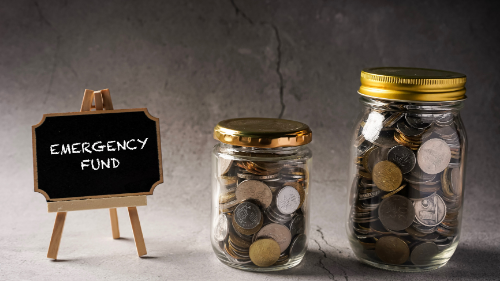One of the best defenses against job loss, illness, emergency travel, and other unforeseen problems is an emergency fund. An emergency fund is money that is set aside in a normal bank account that you can access quickly. For example, if your air conditioner dies or your car breaks down unexpectedly, that is when you’ll use your emergency fund.
Why Have an Emergency Fund?
If you have an emergency fund, you’ll be much less likely to end up in debt by relying on credit cards to cover unexpected expenses. As I have discussed before, reliance on credit cards can often make your life worse when you’re in the middle of a crisis. An emergency fund will eliminate the need for you to use debt to navigate these regular life challenges.
How Much Should I Have in My Emergency Fund?
There are many rules of thumb about how much you need to have in your emergency fund. The amount you save in your emergency fund honestly depends on your financial situation. It depends on how much money you earn, how hard it will be for you to replace that income, your monthly financial obligations, whether some household expenses are covered by another family member, and other issues. But most experts say at least six months of living expenses (after you cut out all unnecessary spending) is a good place to start. However, if you have a business, six months is not enough as businesses can fall on hard times too. You should try to save about 18 months of expenses so that you’re not in jeopardy of going out of business easily.
Where Should I Put My Emergency Fund?
If you are disciplined and know you will not touch your emergency funds, unless there’s a real emergency, then you can just put it in a bank account at your regular bank so that it can be accessed easily with a debit card or a quick transfer of funds. If you think that you will be tempted to use the funds for things outside of an emergency then you should put it in an account that is not as easily accessible.
Most banks and credit unions offer the ability to have a savings account without any fees. So if you can find a high yield savings account that has few penalties for withdrawals, then this would be a good place to hold your emergency funds. However, a Tax-Free Savings Account and a Roth IRA are good options to save your emergency money because these accounts will grow tax-free.
How Do I Build My Emergency Fund?
First, you need to treat it like a bill and add it to your budget. Consider this expense a mandatory fixed amount that must be paid every month. If you can have it withheld from your pay, so much the better as you won’t even see it each month. You know the old saying: Out of sight, out of mind. So if you never look at it, you certainly won’t be tempted to spend it. And every time you get a pay raise you can add this amount to either your emergency fund or your long-term savings, and I guarantee you won’t even notice this either.
A few other strategies that you can use to increase your emergency fund faster are:
- Keep your change in a jar, and when it is full, take it to the bank and deposit the proceeds to your emergency fund.
- Put all savings from coupons towards your savings.
- If you spend less than your budget on any given pay period, move the surplus to your savings.
- If you get a tax refund, save it in your emergency fund every single year.
If you find that you don’t have enough left over after saving to cover your monthly expense, find places to cut expenses so that you don’t feel like building an emergency fund creates an added burden or forces you into debt. If despite your best efforts you still come up short, get an extra job or become an independent contractor to increase your cashflow.
In my opinion, I think it’s best to think of an emergency fund like an insurance policy against unwanted surprises, so the more seriously you take saving money in your emergency fund, the more secured and better off you’ll be. Even if all you can manage to save is $25 per month initially, it will accumulate over time and grow to a larger amount.
The important thing to do is remain committed and add extra contributions when you come into some extra money. Remember that each person will have at least 5 financial emergencies in their lifetime, so having an emergency fund wíll end a lot of stress and avoid using credit for things that are going to happen.
Cars break down, people get sick, houses get damaged and appliances die — it’s all part of life. But having the resources to weather life’s storms when they hit will make all the difference! I have sat in on many client financial reviews and during the review, I have never heard them say “Oh I am so sorry I saved that money …” – It’s generally the opposite.
So I trust you will experience “Happy Savings” on your way to building up your emergency fund!
[/et_pb_text][/et_pb_column][/et_pb_row][/et_pb_section]

